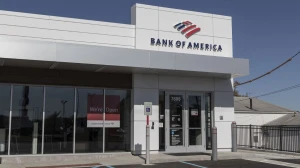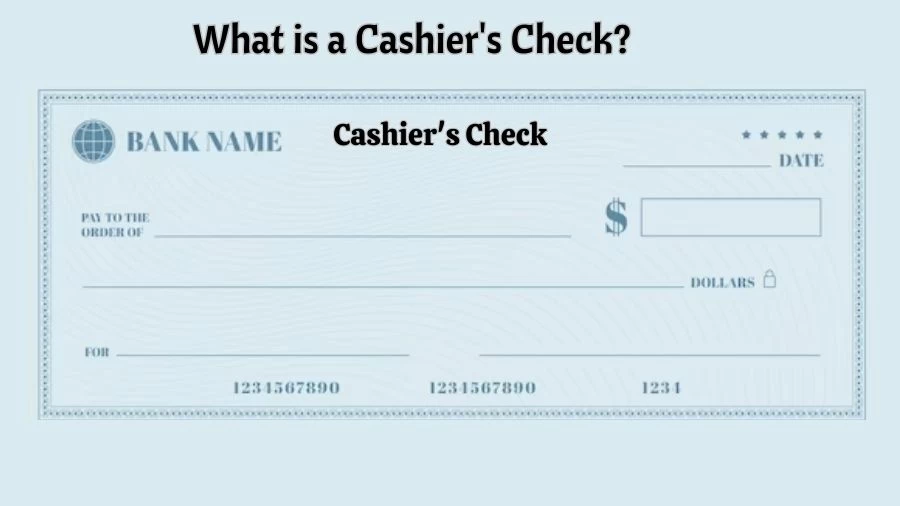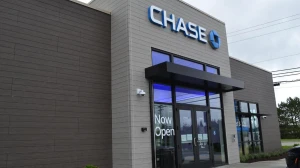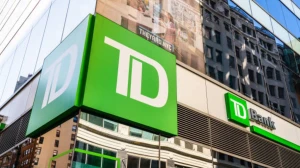
What is a Cashier's Check? How to Get a Cashier's Check?
Cashier's checks offer secure transactions with bank-backed funds, obtained by visiting your bank, providing details, and paying fees, while alternatives include money orders, certified checks, wire transfers, or payment apps.
by Sangamithra
Published Aug 28, 2023 | Updated Aug 28, 2023 | 📖 10 min read
On This Page
- What is a Cashier's Check?
- How to Get a Cashier's Check?
- Where Can I Get a Cashier's Check?
- How Does a Cashier's Check Work?
- How Long is a Cashier's Check Good for?
- Can I Get a Cashier's Check From Any Bank?
- How Much is a Cashier's Check?
- What Does a Cashier's Check Look Like?
- Can You Cancel a Cashier's Check?
- What are the Alternatives to a Cashier's Check?
- What are the Advantages and Disadvantages of Cashier's Check?
What is a Cashier's Check?
Official checks, also known as cashier's checks, offer enhanced levels of security that can enhance the safety and dependability of transactions compared to regular personal checks. Every cashier's check is endorsed by one or multiple authorized bank staff members and might encompass supplementary security elements such as extra watermarking.
Moreover, it possesses the distinctive characteristic of being supported by bank funds rather than personal finances. This imparts confidence to the recipient that the funds are prepared and accessible for their use.
How to Get a Cashier's Check?
To obtain a cashier's check, you can follow these steps:
- Visit your bank or credit union, or connect with them online. Bring a government-issued identification, like a passport or driver's license, when visiting the bank.
- Inform the bank about the amount of the cashier's check and the intended recipient's name. These details will be printed on the check itself.
- Ensure that your checking account holds enough funds to cover the cashier's check. If the balance is insufficient, make a deposit or transfer to cover the required amount.
- Pay any applicable fees and receive the cashier's check. If you're unable to visit the bank in person, they will mail the check to you. A valid U.S. mailing address is necessary for delivery, as cashier's checks cannot be printed at home.
- Typically, cashier's checks are issued to the bank's account holders. However, credit unions often extend this service to members of other credit unions as well as their own members. Keep in mind that you will generally need an account with the bank to obtain a cashier's check from them.
Where Can I Get a Cashier's Check?
You can obtain a cashier's check from various sources, including bank branches, credit unions, and online platforms. If you're wondering where to get a cashier's check, here are the options available to you:
Bank Branches:
One common place to get a cashier's check is at a bank branch. Simply visit your bank and approach a teller to request a cashier's check. Be prepared to provide the necessary details such as the payee's name, the exact payment amount, and any additional notes you want to include on the check. If you're an existing customer, you might need to specify the account from which the funds should be drawn.
Credit Unions:
Like banks, credit unions also offer cashier's checks. Visit a credit union branch and follow a similar process as you would at a bank to request a cashier's check. Ensure you have the required information and identification to complete the transaction.
Online Services:
Some financial institutions provide the option to order cashier's checks online through their websites. Log in to your account, navigate to the relevant section (often under "Order Checks"), and input the necessary details such as the payee's information, amount, and any notes. While this offers convenience, keep in mind that obtaining a cashier's check online might take longer compared to an in-person request.
It's worth noting that while the convenience of online services is available, the option to obtain cashier's checks online might be subject to the specific policies of the financial institution. Additionally, certain banks and credit unions might only issue cashier's checks to their account holders. If you're not a customer, you might need to bring cash to cover the check amount.
How Does a Cashier's Check Work?
When you make a request for a cashier's check to settle a payment with an individual or business, the financial institution initiates a process to ensure the availability of the required funds in your account. Once confirmed, the equivalent amount is subtracted from your account and transferred into the bank's own account.
It's important to note that the issuance of a cashier's check might involve a fee charged by the bank. Subsequently, the financial institution generates the cashier's check, incorporating the payee's name and the specified payment amount. However, instead of imprinting your bank account details and routing number on the check's lower section, the bank's account number is utilized.
When the recipient of the cashier's check deposits it, the funds utilized for the payment are then extracted from the bank's designated account. It's worth mentioning that some banks or credit unions might have a minimum limit on the amount for which they issue cashier's checks.
How Long is a Cashier's Check Good for?
The validity of a cashier's check varies based on the issuing bank's policies and any specified terms. Unlike personal checks, cashier's checks typically don't have a standard expiration date. They are generally considered valid as long as the issuing bank remains operational. Some banks might include an expiration date on the check, often within 60 to 180 days, but this isn't universal.
Occasionally, a "void after X days" disclaimer could be present, indicating a specific timeframe for cashing or depositing the check. State laws and the bank's discretion also play roles. To ensure you maximize the use of a cashier's check, it's advised to act promptly. When dealing with older checks or uncertainty, contacting the issuing bank for guidance is recommended.
Can I Get a Cashier's Check From Any Bank?
Acquiring a cashier's check is generally contingent on your relationship with the financial institution. Most banks exclusively provide cashier's checks to their account holders, necessitating an existing account with the bank. In contrast, credit unions tend to be more accommodating, often extending cashier's check services to members of both their own and other credit unions.
In essence, the ability to obtain a cashier's check is linked to your affiliation with the particular bank or credit union. While banks primarily serve their account holders, credit unions demonstrate a more inclusive approach by often catering to members beyond their institution. Therefore, the option to receive a cashier's check is influenced by the financial institution's policies and your membership status.
How Much is a Cashier's Check?
Getting a cashier's check from your bank or credit union typically incurs a fee ranging from around $8 to $15. However, these fees can vary based on factors such as account type and membership status.
Major U.S. banks, like Bank of America, Capital One, Chase, Citibank, PNC Bank, TD Bank, Truist, U.S. Bank, and Wells Fargo, have their own specific cashier's check fees, which may also be waived under certain conditions. It's advisable to check with your specific institution for the most accurate and up-to-date fee information.
Cashier's Check Fees at Major U.S. Banks:
|
Bank |
Cashier's Check Fee |
|
Bank of America |
$15 (waived for Preferred Rewards clients) |
|
Capital One |
$10 in branch, $20 online |
|
Chase |
$10 (some checking accounts exempt) |
|
Citibank |
$10 (waived for Citi Priority & Citigold) |
|
PNC Bank |
$10 |
|
TD Bank |
$8 |
|
Truist |
$10 (free for Truist Wealth Checking) |
|
U.S. Bank |
$10 |
|
Wells Fargo |
$10 |
What Does a Cashier's Check Look Like?
A cashier's check bears resemblance to a regular check in many aspects. It typically features a section indicating the recipient's name and another for the specified amount. At the uppermost part of the check, the words "Cashier's Check" are usually printed. The check's face displays the bank's particulars, encompassing the bank's name, account number, and routing number.
Additionally, cashier's checks might incorporate watermarks, serving as markers to validate their authenticity as legitimate financial documents. In essence, a cashier's check maintains the basic elements of a check while also exhibiting distinctive traits that confirm its status as a secure and guaranteed form of payment.
Can You Cancel a Cashier's Check?
Cancelling a cashier's check is a complex and intricate procedure, and the feasibility of cancellation depends on the circumstances. Generally, you can contact your bank to inquire about cancelling a cashier's check, particularly if you're dealing with issues like loss, theft, or fraud. However, the process is not as straightforward as cancelling a personal check.
To cancel a cashier's check, you might need to follow these steps:
Declaration of Loss: Typically, you'll be required to submit a formal declaration of loss to the bank. This document affirms that you've lost possession of the cashier's check and provides necessary information about the check.
Indemnity Bond: In some cases, the bank may ask you to obtain an indemnity bond. This bond safeguards the bank in case the misplaced cashier's check is presented for payment.
Bank's Approval: The bank will review your request along with the provided documentation. If your situation aligns with their criteria for cancellation, they might approve the cancellation process.
Refund Process: Once approved, the bank will initiate the refund process. This usually takes time, often around 90 days or more.
It's important to recognize that not all banks permit the cancellation of cashier's checks, and their policies may vary. Moreover, there could be fees associated with the cancellation process. To navigate this process effectively, promptly contact your bank, provide the necessary details, and follow their guidance closely.
What are the Alternatives to a Cashier's Check?
The alternatives to a cashier's check are as follows:
Money Orders: A cost-effective choice, money orders offer secure payment for specific amounts. These can be purchased at various locations such as post offices, supermarkets, and select gas stations. However, money orders are generally suited for smaller amounts compared to cashier's checks.
Certified Checks: Similar to cashier's checks, certified checks ensure the payment amount is guaranteed by the bank. However, they are drawn directly from your account and are considered less secure than cashier's checks.
Wire Transfers: This electronic method swiftly transfers funds from your account to the recipient's without the need for a physical check. Despite its convenience, wire transfers can be pricier than cashier's checks, certified checks, or money orders.
Social Payment Apps: Peer-to-peer (P2P) apps provide a modern solution for sending money to friends or family using email addresses, phone numbers, or app balances. These apps link to bank accounts, debit or credit cards, simplifying transfers.
Each alternative presents unique advantages and considerations, offering flexibility when cashier's checks or personal checks aren't ideal options for your payment needs.
What are the Advantages and Disadvantages of Cashier's Check?
Cashier's checks offer various advantages and disadvantages when it comes to making payments.
Advantages of Cashier's Checks:
- Enhanced Security: As the funds are drawn from the bank's account and guaranteed, concerns about insufficient funds are eliminated. This helps prevent fees related to overdrafts, insufficient funds, or returned payments.
- Swift Funds Availability: Unlike some deposits that may take days to clear, cashier's checks often have shorter hold periods due to their guaranteed nature, accelerating funds availability based on your deposit method.
- Elevated Security Measures: Cashier's checks offer elevated protection against check fraud. They are issued solely to the designated recipient and often incorporate advanced security features like watermarks, minimizing the risk of fraudulent replication.
Disadvantages of Cashier's Checks:
- Not Immune to Fraud: While cashier's checks are more secure than other checks, they can still be targeted by fraudsters. Scammers may produce convincing counterfeit cashier's checks, which only become apparent as fake when depositing.
- Associated Fees: Although some banks extend fee-free cashier's checks, this might be restricted to premium checking accounts. Typically, obtaining a cashier's check comes with a fee ranging from $5 to $15.
- In-Person Requirement: Unlike personal checks that can be written at home, acquiring a cashier's check often demands a visit to the bank. Online ordering might not be available, posing challenges when payment is required outside regular banking hours or locations.
In conclusion, cashier's checks provide secure payment options with expedited funds availability. However, potential risks include fraud susceptibility and associated fees. Additionally, obtaining cashier's checks might necessitate a visit to the bank branch, impacting convenience, especially during non-standard banking hours.
What is a Cashier's Check - FAQ
1. What is a cashier's check?
A cashier's check is a secure form of payment guaranteed by the issuing bank, often used for large transactions.
2. How do I get a cashier's check?
Visit your bank or credit union, provide recipient details and payment amount, ensure funds in your account, pay a fee, and receive the check.
3. Can I get a cashier's check from any bank?
Generally, cashier's checks are available to account holders of the issuing bank, while credit unions might extend this service to their members.
4. What does a cashier's check look like?
Similar to a regular check, it includes recipient and payment details, but with enhanced security features and the bank's account number instead of yours.
5. Can I cancel a cashier's check?
Canceling a cashier's check is possible in cases of loss, theft, or fraud, but the process is complex, involving declarations and potential fees.




